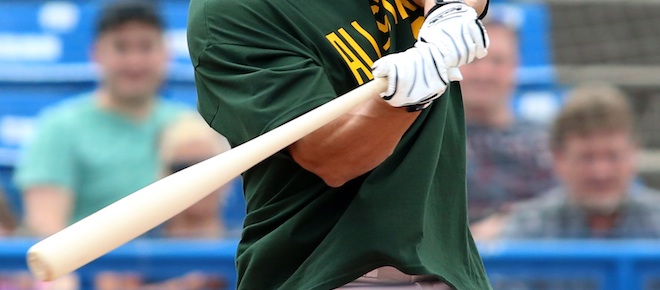Major League Baseball: the intellectual property behemoth
They’re clubbing the creativity of their fan base
Former Major League Baseball star Jose Canseco. (Patrick Doyle/CP)
Share

Luke Simcoe is a guest blogger. He contributes the occasional post on web culture, the various kooks and cranks who inhabit the Internet, as well as copyright matters.
Major League Baseball is once again crying foul over someone’s attempt to have a little baseball-related fun on the Internet.
The league’s latest victim is Atlanta Braves’ fan Everett Steele. Earlier this year, Steele noticed his fellow fans consistently misspelling the team’s name as “Barves” online. He made a few jokes about it on twitter, and before long, the #Barves hashtag had become a moderately successful Internet meme. Hence, in an homage to both web humour and their favourite baseball team, Steele and his wife began making and selling Atlanta “Barves” t-shirts. And, as proof of their fandom and all-around gregariousness, the couple donated the proceeds to the Atlanta Braves Foundation, which supports nonprofits in and around Atlanta.
Within days of the media getting wind of the story, though, Steele got beaned by a cease and desist letter from MLB. According to the league, the Barves logo served to “dilute and/or tarnish the distinctive quality of the Braves Marks” and was thus in violation of the law. Lacking the funds to take on one of the world’s largest sporting businesses in court, Steele shuttered his AtlantaBarves.com website and stopped selling the shirts.
“There were more lawyers CC’d on the cease and desist letter email than I’ve met in my entire life,” Steele told a local news outlet. “So there’s not much fight they’re going to get out of me.”
In total, Steele and his wife donated $850 to the Atlanta Braves Foundation, an amount which they claim exceeds the profits made from the shirts.
This isn’t the first time MLB has played tough guy with intellectual property rights. In 2008, the league shut down an online business that had tweaked team logos to create t-shirts promoting Barack Obama’s presidential bid. In 2009, The Yankees Universe fan blog was shut down after MLB decided it “falsely impl[ied] some endorsement or sponsorship by the Yankees.” In a particularly flagrant example from 2010, the league kiboshed a shirt featuring a stylized image of Texas Rangers manager Ron Washington and subsequently trademarked Washington’s catchphrase “That’s the way baseball go.”
Oh, and let’s not forget that MLB also trademarked the phrase “Los Doyers”–used affectionately by Latino fans of the L.A. Dodgers–so as to cash in on the merchandising opportunities.
Now, MLB has been around in some form or another since 1869, so perhaps we can forgive the league for failing to understand intellectual property in the age of the Internet and social media, and adopting a trenchant “get off my lawn.” Still, there’s little excuse for viciously trampling the creativity of your fan base just so you can use it yourself to make a profit.
When asked how he felt about MLB’s response, Steele put it perfectly: “Instead of. . . capitalizing on the opportunity to sort of catalyze their fan base, they’ve instead attacked the people who are passionate and love their brand.”